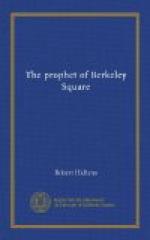“All about what? Remember, please, that I’m a young woman and that all young women share one quality. All about what, please?”
Mrs. Merillia looked at the Prophet. The Prophet looked at Sir Tiglath, who wagged his great head and cried, with rolling pathos and rebuke,—
“Oh-h-h-h!”
“Please—Mr. Vivian!” repeated Lady Enid, with considerable determination.
“Grannie means that I—that—well, that I have been enabled by the stars to foretell certain future events,” said the Prophet, glancing rather furtively at Sir Tiglath while he spoke, to note the effect of the desperate declaration.
“Oh-h-h-h!” bellowed the distressed astronomer, shaking like a jelly in his wrath.
“What?” cried Lady Enid, in an almost piercing voice, and with a manner that had suddenly become most animated. “What—like Malkiel’s Almanac does?”
This remark had a very striking effect upon Sir Tiglath, an effect indeed so striking that it held Mrs. Merillia, Lady Enid and the Prophet in a condition of paralytic expectation for at least three minutes by the grandmother’s clock in the corner of the drawing-room.
The venerable astronomer was already very stout in person and very inflamed in appearance. But at this point in the discourse he suddenly became so very much stouter and so very much more inflamed, that his audience of three gazed upon him rather as little children gaze upon dough which has been set by the cook to “rise” and which is fulfilling its mission with an unexpected, and indeed intemperate, vivacity. Their eyes grew round, their features rigid, their hands tense, their attitudes expectant. Leaning forward, they stared upon Sir Tiglath with an unwinking fixity and preternatural determination that was almost entirely infantine. And while they did so he continued slowly to expand in size and to deepen in colour until mortality seemed to drop from him. He ceased to be a man and became a phenomenon, a purple thing that journeyed towards some unutterable end, portentous as marching judgment, tragic as fate, searching as epidemic, and yet heavily painted and generally touched up by the brush of some humorous demon, such as lays about him in preparation for Christmas pantomime, sworn to provide the giants’ faces and the ogres’ heads for Drury Lane.
“Don’t!” at last cried a young voice. “Don’t, Sir Tiglath!”
A peal of laughter followed the remark, of that laughter which is loud and yet entirely without the saving grace of merriment, a mere sudden demonstration of hysteria.
“Oh, Sir Tiglath—don’t!”
A second laugh joined the first and rang up with it, older, but also hysterical—Mrs. Merillia’s.
“No, no—please don’t, Sir Tig—Tig—”
A third laugh burst into the ring, seeming to complete it fatally—the Prophet’s.
“Sir Tiglath—for Heaven’s sake—don’t!”
The adjuration came from a trio of choked voices, and might have given pause even to a descending lift or other inflexible and blind machine.




